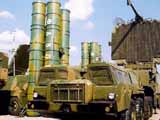|
|
TODAY.AZ / World news
Russia stands by S-300 delivery to Iran
20 February 2010 [14:25] - TODAY.AZ
The Russian Deputy Foreign Minister says his country has every intention of delivering the advanced S-300 air defense missile systems to the Islamic Republic.
 Israeli daily Haaretz reported on Tuesday that Prime Minister Benjamin Netanyahu, who visited Russia on Tuesday, has been assured that the sale of the S-300 anti-aircraft system to Iran “will be held off” by the Kremlin.
Israeli daily Haaretz reported on Tuesday that Prime Minister Benjamin Netanyahu, who visited Russia on Tuesday, has been assured that the sale of the S-300 anti-aircraft system to Iran “will be held off” by the Kremlin.However, Russian Deputy Foreign Minister Sergei Ryabkov commented on the report, saying that the deal is still in motion.
“There is a contract to supply these systems to Iran, and we will fulfill it … Delays (with deliveries) are linked to technical problems with adjusting these systems,” Ryabkov said on Friday.
The Russian official warned against attempts in Israel and the US to politicize and, to some extent, demonize the nature of Russia's arms export to Iran.
“It is absolutely incorrect to put the emphasis on the issue of S-300 supplies... and to turn it into a major problem, to say nothing of linking it to the discussion on restoring trust in the purely peaceful character of Iran's nuclear program,” Ryabkov said.
Faced with a looming threat against its enrichment infrastructure, Tehran has decided to acquire the sophisticated S-300, a mobile land-based system designed to detect and shoot down aircraft within a 120 km (75 miles) distance.
Codenamed 'the SA-20 Gargoyle' by NATO, the system also features high jamming immunity and is capable of simultaneously engaging up to 100 targets.
If delivered, SA-20 would make Iranian nuclear sites 'invincible' in the face of any attack, including aerial saturation bombings typical of Israel.
With that in mind, the Israeli leadership is gone to great lengths to stop Iran from acquiring the S-300 defense system.
"The S-300 is a Russian-made surface-to-air missile system that is very advanced, with long ranges and many capabilities," Israeli Air Force (IAF) commander, Major General Ido Nehushtan said in September.
"We need to make every effort to stop this system from getting to places where the IAF needs to operate or may need to operate in the future," he added.
Israel has on numerous occasions threatened to bomb Iran's nuclear sites, arguing that the country's enrichment activities are an existential threat to Tel Aviv, which ironically is reported to have an arsenal of 200 nuclear warheads at its disposal.
This is while Tehran says its enrichment program is purely peaceful and unlike Tel Aviv, has allowed regular inspections of its nuclear installations.
/Press TV/
URL: http://www.today.az/news/regions/62122.html
 Print version
Print version
Views: 2638
Connect with us. Get latest news and updates.
See Also
- 22 April 2025 [23:30]
United States close hypersonic missile development program - 22 April 2025 [21:22]
World's largest amphibious aircraft put into operation in China - 22 April 2025 [20:40]
South Korea launch fourth reconnaissance satellite into orbit - 22 April 2025 [19:38]
UAE plans to use artificial intelligence in development of new legislation - 22 April 2025 [08:00]
New Android virus discover that steals bank card data via NFC - 21 April 2025 [23:23]
Hungarian wines receive prizes of international competition - 21 April 2025 [22:50]
Kazakhstan strengthens its position on world tourist map - 21 April 2025 [21:43]
Special beach for visually impaired open in Abu Dhabi - 21 April 2025 [21:20]
New evidence of Mars' wet and warm past discover - 21 April 2025 [20:38]
Hyundai electric buses to run on Japan's ecologically sensitive Yakushima Island
Most Popular
 What von der Leyen doesn't know about. Or doesn't want to know
What von der Leyen doesn't know about. Or doesn't want to know
 Culture Minister meets with Kyrgyz counterpart in Bishkek
Culture Minister meets with Kyrgyz counterpart in Bishkek
 Trump sees hope for Ukraine-Russia deal, analysts remain skeptical
Trump sees hope for Ukraine-Russia deal, analysts remain skeptical
 Leyla Aliyeva visits school for visually impaired in Hanoi
Leyla Aliyeva visits school for visually impaired in Hanoi
 Pakistani PM hails Lahore-Baku direct flights as key milestone
Pakistani PM hails Lahore-Baku direct flights as key milestone
 Baku to Host Second Turkic Trade and Investment Forum in June
Baku to Host Second Turkic Trade and Investment Forum in June
 Baku court resumes trial of Armenian-origin individuals accused of war crimes
Baku court resumes trial of Armenian-origin individuals accused of war crimes
